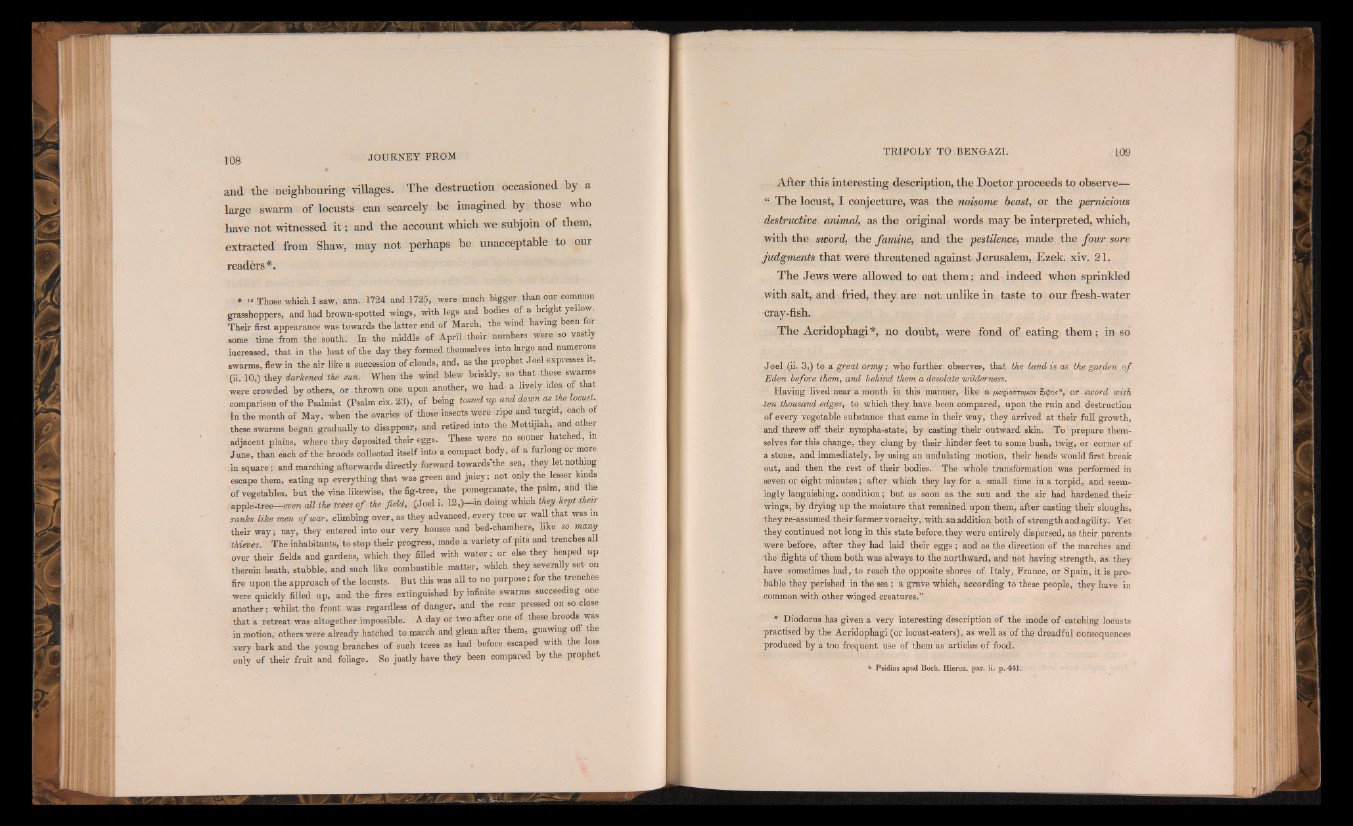
and the neighbouring villages. The destruetion occasioned by a
large swarm of locusts can scarcely be imagined by those who
have not witnessed i t ; and the account which we subjoin of them,
extracted from Shaw, may not perhaps be unacceptable to our
readers*.
* “ Those which I saw, ann. 1724 and 1725, were much bigger than our common
grasshoppers, and had brown-spotted wings, with legs and bodies of a bright yellow.
Their first appearance was towards the latter end of March, the wind having been or
some time from the south. In the middle • of April .their numbers were so vast y
increased, that in the heat of the day they formed themselves into large and numerous
swarms, flew in the air like a succession of clouds, and, as the prophet Joel expresses it,
(ii. 10,) they darkened the sun. When the wind blew briskly, so that these swarms
were crowded by others, or thrown one upon another, we had- a lively idea of that
comparison of the Psalmist (Psalm cix. 23), of being tossed up and down as the locust
In the month of May, when the ovaries of those insects were ripe and turgid, each o
these swarms began gradually to disappear, and retired into the Mettijiah, and ot er
adjacent plains, where they deposited their eggs. These were no sooner ^ c ® 111
June, than each of the broods collected itself into a compact body, of a furlong or more
in square; and marching afterwards directly forward towards'the sea, they let nothing
escape them, eating up -everything that was green and juicy; not only the lesser kinds
of vegetables, but the vine likewise, the fig-tree, the pomegranate, the palm, and the
apple-tree—even all the trees o f the field, (Joel i. 1 2 ,)-in doing which they kept their
ranks like men o f war, climbing over, as they advanced, every tree or wall that was m
their way; nay, they entered into our very houses and bed-chambers, like so many
thieves. The inhabitants, to stop their progress, made a variety of pits and trencheB all
over their fields and gardens, which they filled with water; or else they heaped up
therein heath, stubble, and such like combustible matter, which they severally set-on
fire upon the approach of the locusts. But this was all to no purpose; for the trenches
were quickly filled up, and the fires extinguished by infinite swarms succeeding one
another; whilst the front was regardless of danger, and the rear pressed on so close
that a retreat was altogether impossible. A day or two after one of these broods was
in motion, others were already hatched to march and glean after them, gnawing o t e
.very bark and the i young branches of such trees as had before escaped with the loss
only of their fruit and foliage. So justly have they been compared by the prophet
After this interesting description, the Doctor proceeds to observe—
“ The locust, I conjecture, was the noisome beast, or the pernicious
destructive animal, as the original words may be interpreted, which,
with the sword, the famine, and the pestilence, made the four sore
judgments that were threatened against Jerusalem, Ezek. xiv. 21.
The Jews were allowed to eat them; and indeed when sprinkled
with salt, and fried, they are not unlike in taste to our fresh-water
cray-fish.
The Acridophagi*, no doubt, were fond of eating them; in so
Joel (ii. 3,) to a great army-; who further observes, that the land is as the garden o f
Eden before them, and behind them a desolate wilderness.
Having lived near a month in this manner, like a/xi/gioaro/*ov £i<pos-a, or sword with
ten thousand edges,- to which they have been compared, upon the ruin and destruction
of every vegetable substance that came in their way, they arrived at their full growth,
and threw off their nympha-state, by casting their outward skin. To prepare themselves
for this change, they clung by their hinder feet to some bush, twig, or corner of
a stoiie, and immediately, by using an undulating motion, their heads would first break
out, and then the rest of their bodies. The whole transformation was performed in
seven or eight'minutes; after which they lay for a small time in a torpid, and seemingly
languishing, condition; but as soon as the sun and the air had hardened their
wings, by drying up the moisture that remained upon them, after casting their sloughs,
they re-assumed their former voracity, with an addition both of strength and agility. Yet
they continued not long in this state before.they were entirely dispersed, as their parents
were before, after they had laid their eggs ; and as the direction of the marches and
the flights of them both was always to the northward, and not having strength, as they
have sometimes had, to reach the opposite shores of Italy, France, or Spain, it is probable
they perished in the sea; a grave which, according to these people, tjiey have in
common with other winged creatures.”
* Diodorus has given a very interesting description of the mode of catching locusts
practised by the Acridophagi (or locust-eaters), as well as of the dreadful consequences
produced by a too frequent use of them as articles of food.
* Psidias apud Bocli. Hieroz. par. ii. p. 441.